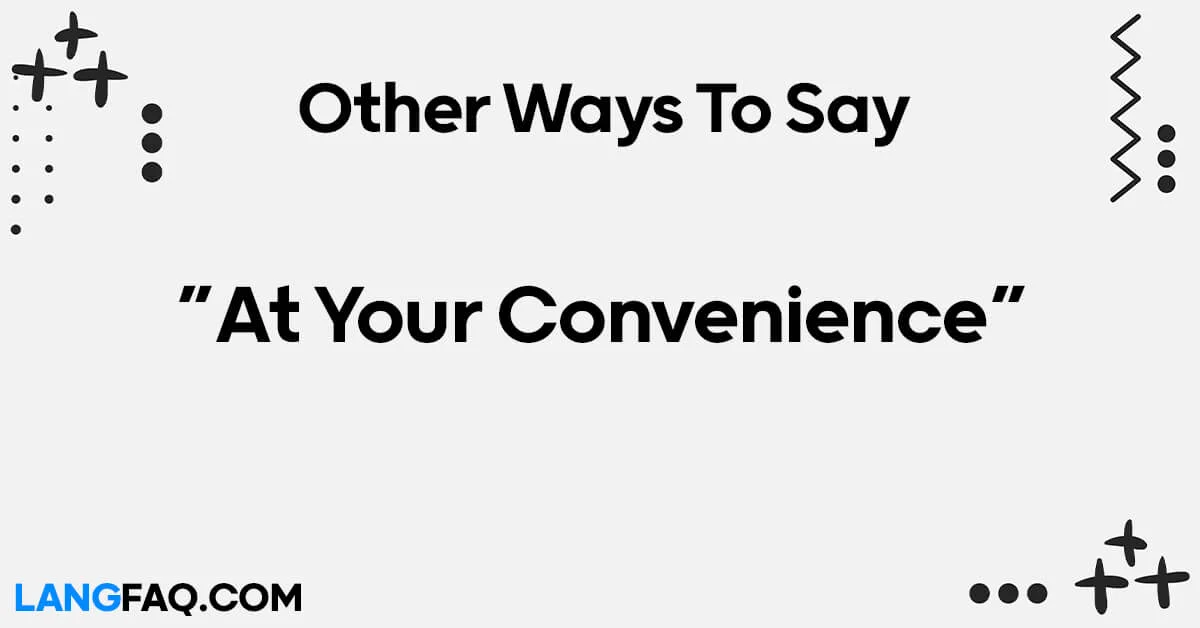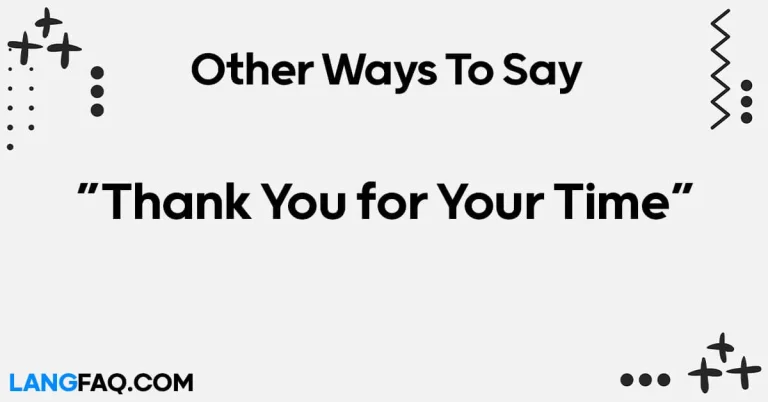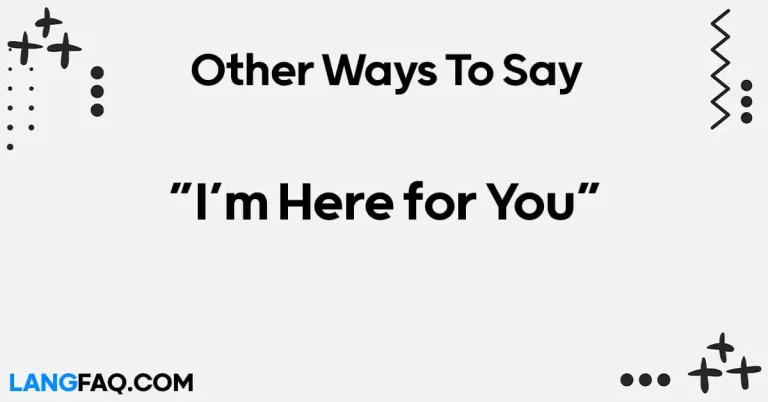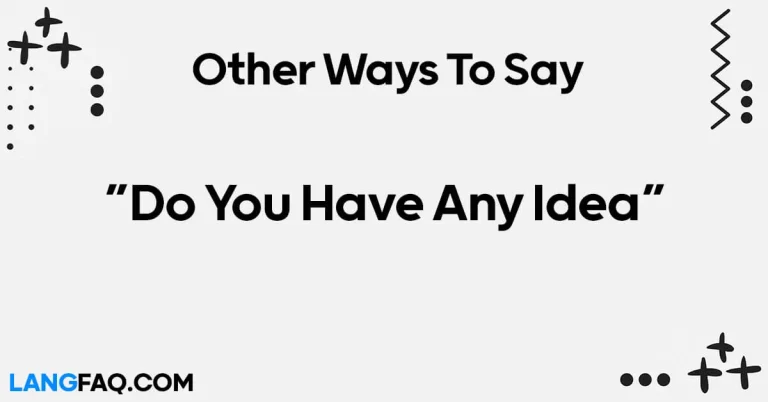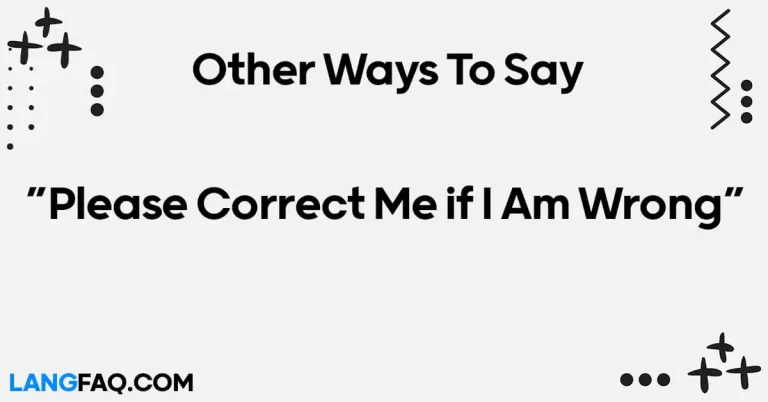In the realm of effective communication, finding diverse ways to express common phrases adds depth and versatility to your language. “12 Other Ways to Say ‘At Your Convenience'” delves into alternative expressions that can elevate your conversations. Let’s explore these phrases that not only convey the same meaning but also inject flair into your interactions.
12 Other Ways to Say “At Your Convenience”
Here are 12 alternative ways to express “At Your Convenience”:
- At a Time That Suits You
- When You’re Available
- When It’s Convenient for You
- According to Your Schedule
- When You Have Time
- At Your Leisure
- When It Works for You
- In Accordance with Your Availability
- When You’re Free
- Your Preferred Time
- Scheduling Harmony
- Tailored to Your Convenience
Here’s a table with meanings and examples for the 12 ways to say “At Your Convenience”:
| Expression | Meaning | Example |
|---|---|---|
| At a Time That Suits You | When it’s convenient for the other person. | “We can meet at a time that suits you best.” |
| When You’re Available | When the other person is free or ready. | “Let me know when you’re available for a quick discussion.” |
| When It’s Convenient for You | When it works well for the other person’s schedule. | “Please complete the task when it’s convenient for you.” |
| According to Your Schedule | Aligning with the other person’s timetable. | “We’ll arrange the meeting according to your schedule.” |
| When You Have Time | Requesting a suitable time when the person is free. | “Let’s catch up when you have time this week.” |
| At Your Leisure | When the other person is free to do something. | “Feel free to respond at your leisure.” |
| When It Works for You | Requesting a time that fits the other person’s plans. | “Let’s schedule the call when it works for you.” |
| In Accordance with Your Availability | Aligning actions with the other person’s schedule. | “We’ll proceed in accordance with your availability.” |
| When You’re Free | Asking for a time when the person is not busy. | “Give me a call when you’re free.” |
| Your Preferred Time | Requesting the person’s preferred time for an activity. | “Let me know your preferred time for the interview.” |
| Scheduling Harmony | Achieving a balance in coordinating schedules. | “Our aim is to find scheduling harmony for all team members.” |
| Tailored to Your Convenience | Customizing arrangements to fit the other person’s needs. | “We’ll ensure the plan is tailored to your convenience.” |
In essence, these alternatives provide a spectrum of ways to express “At Your Convenience,” allowing for flexibility and consideration in various communication scenarios. Tailoring your language to the preferences and schedules of others contributes to smoother and more amicable interactions.
Is It Correct to Say “At Your Convenience”?
Yes, it is entirely correct to say “At Your Convenience.” This phrase is a polite and formal way to express flexibility and consideration regarding the timing of a meeting, conversation, or any other engagement. It is commonly used in both professional and personal contexts to indicate that the speaker is willing to accommodate the other person’s schedule.
When to Use “At Your Convenience”:
1. Professional Settings:
Example: “I would appreciate the opportunity to discuss the proposal at your convenience. Please let me know when it suits you.”
Email Sample:
Subject: Request for Discussion at Your Convenience
Dear [Recipient’s Name],
I hope this message finds you well. I would like to discuss the upcoming project and gather your insights. Could we arrange a meeting at your convenience? Your time is highly valued.
Best regards, [Your Name]
2. Scheduling Appointments:
Example: “Feel free to book a time at your convenience for a one-on-one consultation with our team.”
Email Sample:
Subject: Scheduling a Consultation at Your Convenience
Hi [Client’s Name],
We would be delighted to offer you a personalized consultation. Please click the link below to schedule a time at your convenience.[Insert scheduling link]Looking forward to our discussion.
Regards, [Your Name]
3. Informal Conversations:
Example: “We can catch up for coffee whenever it’s at your convenience. Just let me know.”
Email Sample:
Subject: Casual Meetup
Hey [Friend’s Name],
It’s been a while since we caught up. How about grabbing a coffee whenever it’s at your convenience? Let me know when works for you.
Cheers, [Your Name]
Is It Too Formal?
While “At Your Convenience” leans towards formality, it is generally well-received in both formal and informal settings. However, if you are in a very casual conversation with friends, you might opt for more relaxed alternatives like “whenever you’re free” or “when it suits you.”
Pros and Cons:
- Pros:
- Polite and respectful.
- Indicates flexibility.
- Suitable for various contexts.
- Cons:
- Might sound too formal in very casual situations.
- Some may find it a bit old-fashioned.
Professional Mail Example With “At Your Convenience”
Subject: Request for Meeting at Your Convenience
Dear [Recipient’s Name],
I trust this email finds you well. I am writing to request a meeting with you to discuss the upcoming marketing campaign strategy.
Considering your expertise in the field, your insights are crucial for shaping the success of this campaign. I am available to meet at any time that suits you in the coming week. Please let me know a slot that aligns with your schedule, and I will make the necessary arrangements.
The agenda will cover key aspects such as target audience analysis, content creation, and the overall timeline for implementation. Your input will greatly contribute to the effectiveness of our strategy.
If an in-person meeting is more convenient, I am happy to adjust my location to accommodate you. Alternatively, a virtual meeting can be arranged for your ease and flexibility.
Your time and expertise are highly valued, and I am committed to ensuring this discussion happens at your convenience. I look forward to your response, and I am excited about the prospect of collaborating on this important project.
Thank you for considering my request. Please feel free to suggest a time that works best for you.
Best regards,
[Your Full Name] [Your Position] [Your Company] [Your Contact Information]
At a Time That Suits You
Finding the right moment for a meeting or discussion is crucial in both professional and personal settings. The phrase “At a Time That Suits You” is a courteous and considerate way to express this necessity.
Scenario: In a professional context, when scheduling a virtual meeting with a colleague, you might say, “I’d like to discuss the project further. Could we meet at a time that suits you best?” This allows the other person to choose a time convenient for them, fostering a collaborative and respectful environment.
Example Sentence: “I appreciate your busy schedule. Let’s connect at a time that suits you for a detailed project update.”
Email Sample:
Subject: Setting Up a Convenient Meeting Time
Dear [Colleague’s Name],
I hope this email finds you well. I’m eager to discuss the upcoming project and would like to arrange a meeting at a time that suits you. Could you please share your availability for the coming week? Your flexibility is greatly appreciated.
Looking forward to our productive discussion.
Best regards, [Your Name]
When You’re Available
This phrase is ideal when you want to leave the scheduling decision to the other person. It works well in both formal and informal scenarios, giving the flexibility needed for a smooth interaction.
Scenario: In a mentor-mentee relationship, a mentee might say, “I’d like some guidance on my career path. Can we discuss it when you’re available?” This conveys respect for the mentor’s time while seeking valuable advice.
Example Sentence: “I understand you have a busy schedule. Let’s talk about the project when you’re available, and we can brainstorm ideas together.”
Email Sample:
Subject: Seeking Your Valuable Input
Dear [Mentor’s Name],
I hope this email finds you in good spirits. I’m seeking your valuable insights on the recent project. Can we schedule a discussion when you’re available? Your guidance is highly appreciated.
Thank you, [Your Name]
When It’s Convenient for You
Expressing the idea that you are flexible and willing to adapt to the other person’s schedule is essential for maintaining positive relationships. “When It’s Convenient for You” is a versatile phrase suitable for various contexts.
Scenario: In a professional setting, you might say, “I’d like your input on the proposal. Let’s discuss it when it’s convenient for you.” This shows consideration for the other person’s workload.
Example Sentence: “Your feedback is crucial. We can go over the marketing strategy when it’s convenient for you, ensuring we have ample time for discussion.”
Email Sample:
Subject: Request for Your Input on Proposal
Dear [Recipient’s Name],
I hope this email finds you well. I would appreciate your insights on the latest proposal. Could we schedule a meeting when it’s convenient for you? Your expertise is invaluable to this discussion.
Best regards, [Your Name]
According to Your Schedule
This phrase adds a level of formality to your request, suitable for professional and official interactions. It acknowledges the importance of aligning with the other person’s timetable.
Scenario: When setting up a job interview, you might say, “We’d like to conduct the interview according to your schedule. Please let us know your preferred date and time.” This respects the candidate’s time constraints.
Example Sentence: “We value your time. Let’s plan the project kick-off meeting according to your schedule, ensuring everyone can participate.”
Email Sample:
Subject: Interview Schedule Coordination
Dear [Candidate’s Name],
We appreciate your interest in the position. To accommodate your schedule, we’d like to coordinate the interview according to your availability. Please let us know your preferred date and time.
Warm regards, [Your Name]
When You Have Time
Using this phrase adds a touch of informality to your request. It’s suitable for both professional and personal situations, creating an open and friendly atmosphere.
Scenario: In a casual conversation with a friend, you might say, “I have some exciting news to share. Can we catch up when you have time?” This allows your friend to choose a moment convenient for them.
Example Sentence: “Your opinion is valuable. Let’s discuss the project when you have time, and we can bounce around some ideas.”
Email Sample:
Subject: Quick Catch-Up and Project Discussion
Hey [Friend’s Name],
Hope you’re doing well! I have some exciting updates to share. Can we catch up when you have time? Also, I’d love your thoughts on the upcoming project.
Cheers, [Your Name]
At Your Leisure
This expression combines formality with a sense of relaxation, making it suitable for various contexts. It implies that the other person can respond or act at their own pace.
Scenario: When asking for feedback on a document, you might say, “Please review the report at your leisure and let me know your thoughts.” This allows the recipient to prioritize the task.
Example Sentence: “I understand you’re busy. Take a look at the proposal at your leisure, and we can schedule a discussion afterward.”
Email Sample:
Subject: Request for Feedback at Your Leisure
Dear [Recipient’s Name],
I hope this email finds you well. I’ve attached the latest report for your review. Please go through it at your leisure, and we can discuss any feedback you may have.
Best regards, [Your Name]
When It Works for You
This phrase suggests collaboration and flexibility, making it suitable for both professional and personal contexts. It implies a shared effort to find a mutually convenient time.
Scenario: When coordinating with a team member, you might say, “Let’s plan the workshop when it works for you as well. We want everyone to participate comfortably.” This promotes teamwork.
Example Sentence: “Your expertise is crucial. Let’s set up a training session when it works for you, ensuring all team members can attend.”
Email Sample:
Subject: Coordinating Workshop Schedule
Hi [Team Member’s Name],
I hope you’re doing great. I’d like to discuss scheduling the upcoming workshop. Let’s coordinate a time when it works for you and the rest of the team.
Thanks, [Your Name]
In Accordance with Your Availability
This formal expression is ideal for professional contexts where adherence to schedules and timelines is crucial. It emphasizes aligning actions with the other person’s availability.
Scenario: In a business meeting, you might say, “We aim to finalize the proposal in accordance with your availability. Please share your preferred timeline.” This shows respect for the decision-maker’s time.
Example Sentence: “Your input is valuable. Let’s refine the project plan in accordance with your availability, ensuring a smooth execution.”
Email Sample:
Subject: Coordination for Project Planning
Dear [Recipient’s Name],
I trust this email finds you well. We’re in the process of planning the upcoming project and would like to do so in accordance with your availability. Could you please share your preferred timeline for discussions?
Warm regards, [Your Name]
When You’re Free
This phrase is straightforward and suitable for various situations. It’s an excellent choice when you want the other person to pick a time that suits them without any specific constraints.
Scenario: In a casual conversation with a colleague, you might say, “I have some updates on the client meeting. Let’s catch up when you’re free.” This allows flexibility in scheduling.
Example Sentence: “Your insights are crucial. Let’s discuss the client feedback when you’re free, and we can plan our next steps.”
Email Sample:
Subject: Quick Discussion on Client Meeting
Hey [Colleague’s Name],
Hope you’re having a great day! I have some updates on the recent client meeting. Can we catch up when you’re free?
Thanks, [Your Name]
Your Preferred Time
This phrase adds a personal touch to your request, making it suitable for professional interactions where customization and consideration for the other person’s preferences are important.
Scenario: When coordinating with a client, you might say, “We’d like to arrange the presentation at your preferred time. Please let us know when suits you best.” This demonstrates a client-centric approach.
Example Sentence: “Your feedback is essential. Let’s schedule the review at your preferred time, ensuring it aligns with your priorities.”
Email Sample:
Subject: Scheduling Client Presentation
Dear [Client’s Name],
I trust this email finds you well. We’re eager to present our latest findings. Could you please let us know your preferred time for the presentation? Your convenience is our priority.
Best regards, [Your Name]
Scheduling Harmony
This phrase emphasizes the seamless coordination of schedules, making it ideal for collaborative efforts where everyone’s participation is essential.
Scenario: In a team discussion about a project kickoff, you might say, “Our goal is to achieve scheduling harmony for all team members. Let’s find a time that accommodates everyone.” This promotes inclusivity.
Example Sentence: “Your input is crucial. Let’s aim for scheduling harmony in our team meetings, ensuring everyone can actively contribute.”
Email Sample:
Subject: Coordinating Team Meeting Schedule
Hi [Team Member’s Name],
I hope this email finds you well. We’re in the process of scheduling our next team meeting and aim for scheduling harmony. Could you please share your availability for the upcoming week?
Thanks, [Your Name]
Tailored to Your Convenience
This phrase emphasizes customization to fit the other person’s needs and preferences. It’s suitable for situations where a personalized approach is valued.
Scenario: When organizing a training session for a diverse audience, you might say, “We’ll ensure the training materials are tailored to your convenience, addressing specific needs and learning styles.” This shows a commitment to individualized experiences.
Example Sentence: “Your learning preferences matter. We’ll design the workshop content tailored to your convenience, ensuring an effective and engaging session.”
Email Sample:
Subject: Customized Workshop Materials
Dear [Participant’s Name],
We’re thrilled to have you in our upcoming workshop. To make the session valuable for you, could you please share any specific topics or preferences? We want to ensure the content is tailored to your convenience.
Looking forward to your insights, [Your Name]
Answering Common Questions
What’s the Polite Way to Say “At Your Convenience”? In formal settings, opt for expressions like “at your leisure” or “at a time that suits you” to convey politeness and consideration.
Can I Use Casual Alternatives in Business Communication? Yes, phrases like “when it works for you” or “when you’re free” can add a friendly touch to professional communication without compromising decorum.
Are These Expressions Universally Understood? While idiomatic, these expressions are widely recognized in English-speaking contexts, ensuring effective communication across various scenarios.
How Can I Personalize These Alternatives? Tailor expressions by adding personal touches. For instance, “your preferred time” adds a considerate touch to scheduling.
Is “In Accordance with Your Schedule” Too Formal? While formal, it conveys professionalism. Consider the context; it might be ideal for business-related discussions.
Can I Combine Expressions for Versatility? Absolutely! Mix and match expressions to suit different situations, showcasing your linguistic dexterity.
Conclusion
In conclusion, mastering various ways to say “At Your Convenience” not only enhances your linguistic prowess but also adds a layer of sophistication to your communication. Tailor your expressions to fit diverse scenarios, making every interaction memorable and impactful.

